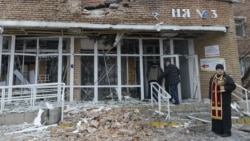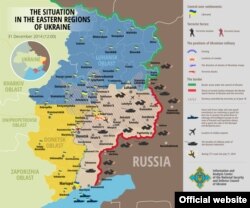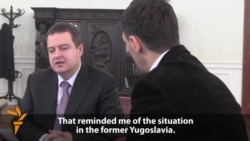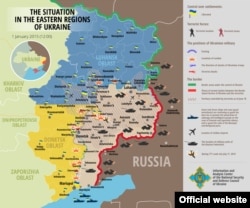Russia's TASS news agency reporting that talks to be held in Luhansk today:
A working group involving representatives of Ukraine's Luhansk and Donetsk self-proclaimed republics, Kiev authorities and the Organization for Security and Cooperation in Europe (OSCE) officials will meet in Luhansk on December 31, Luhansk republic plenipotentiary representative at the Contact Group talks Vladislav Deinego told TASS.
“Law enforcers will meet in Luhansk on Wednesday,” he said.
Asked whether any cardinal agreements may be reached at this meeting he said that“everything depends on the result.
On Tuesday, Assistant Commander of Luhansk militia corps Vitaly Kiselev said negotiators plan to talk “military issues raised earlier at the Contact Group meeting over crisis settlement in [highly volatile Ukrainian industrial area] Donbass in [Belarusian capital] the city of Minsk.”
The similar meeting was held on Monday, December 29, in another embattled east Ukrainian city of Donetsk. Talks raised three issues, including continuation of Minsk peace negotiations, ceasefire and pullback of heavy weaponry from the disengagement line, the press service of the Donetsk Defense Ministry reported then. Meanwhile, negotiating parties agreed on a next stage of captive swap.
As we noted last night, Oliver Stone has decided the Maidan was a CIA plot:
U.S. filmmaker Oliver Stone, who is working on a documentary film about recent events in Ukraine, says he believes the February 20 shootings in Kyiv that left dozens dead and injured were carried out by "foreign elements" and the incident had "CIA fingerprints on it."
Stone made the comments in a December 30 Facebook post, saying he just returned from Moscow where he interviewed former Ukrainian President Viktor Yanukovych.
Stone did not say why "it seems clear" that the shooters were "outside third-party agitators," but added that details would be included in his film.
Stone also asserted that "well-armed, neo-Nazi radicals forced Yanukovych to flee the country with repeated assassination attempts" and compared the situation to a 2002 attempted coup against Venezuelan President Hugo Chavez.
Yanukovych fled to Russia days after the shootings, following months of protests over his decision to scrap plans for a landmark deal with the EU and bolster ties with Moscow.
Stone said that "the West has maintained the dominant narrative of 'Russia in Crimea' whereas the true narrative is 'USA in Ukraine.'" He called it "a dirty story through and through."
Russia annexed Crimea from Ukraine in March, in a move condemned as illegal by Kyiv and the West.
Here is today's situation map of eastern Ukraine by the National Security and Defense Council:
From RFE/RL's News Desk:
Inflation in Russia ran at 11.4 percent in 2014, the highest rate since the global crisis year of 2008.
Meanwhile, Finance Minister Anton Siluanov said on December 31 that the government will ask the Duma to increase the 500 billion ruble ($8.5 billion) limit on spending from the National Wealth Fund as the Kremlin scrambles to maintain social and defense spending in the face of declining revenues.
"We are going to have to use our safety cushion," Siluanov said in a televised interview.
Russia's state statistics agency released preliminary data on December 31 showing that inflation was 2.6 percent in December, the highest monthly rate since January 2005. That was up from 1.3 percent in November.
The projected annual inflation rate of 11.4 percent is up from 6.5 percent in 2013 and 6.6 percent in 2012. In 2008, inflation was 13.3 percent.
Russia's economy has been strained this year in the face of low global energy prices and Western sanctions that have restricted access to Western financing.
We are closing the live blog early today. Will be back tomorrow. Here's to a peaceful 2015.
From RFE/RL's News Desk:
Russian President Vladimir Putin used his New Year's speech to hail Russia's annexation of Ukraine's Crimea Peninsula.
Putin said Crimea's "return home" will "forever remain an important milestone in our history."
Putin also thanked Russians for their "unfaltering readiness to defend Russia's interests."
Putin said: "I would like to sincerely thank you for unity and solidarity, for the deep feelings of truth, honor, justice and responsibility for the fate of your country."
Putin also hailed Russia's hosting of the Winter Olympics in the resort town of Sochi as the "best ever."
Serbia has taken over the rotating chairmanship of the Organization for Security and Cooperation in Europe (OSCE), saying that de-escalation of the crisis in Ukraine is its top priority.
Serbia will present the agenda of its chairmanship in Vienna on January 15, according to an Internet statement posted on January 1.
On December 31, Serbian Foreign Minister Ivica Dacic told RFE/RL's Balkan Service that he believes Serbia can help the OSCE act as "a fair and objective mediator" because the country has good relations with both Kyiv and Moscow.
The OSCE, together with Ukraine and Russia, are participating in the contact group in talks with pro-Russian separatists in eastern Ukraine, and the OSCE has a monitoring mission in Ukraine, with the exception of Crimea.
Russia annexed the Ukrainian Black Sea region of Crimea in March.
Dacic said in the January 1 statement that Serbia intends to "bring its own experience as a country that has emerged from conflict and that is in transition toward democracy."
During Serbia's chairmanship, the OSCE will mark the 40th anniversary of the Helsinki Final Act, which served as the foundation for the creation of the OSCE.
Russia Critics Omitted From Putin's New Year's Greetings
Russian President Vladimir Putin has issued his New Year's greetings to fellow world leaders and dignitaries, but Ukrainian President Petro Poroshenko is not among the dozens of recipients.
A summary of Putin's messages to the leaders of more than 30 countries, plus Pope Francis and the heads of the breakaway Georgian regions of Abkhazia and South Ossetia and a select group of former world leaders, was posted on the Kremlin's website on December 31.
In addition to Poroshenko, the leaders of Estonia, Latvia, Lithuania, and Poland -- all countries that have led global criticism of Russia's actions in Ukraine -- were omitted.
Norway and Sweden were also skipped.
Estonian President Toomas Ilves quipped on Twitter that he was "crushed."
In his message to U.S. President Barack Obama, Putin mentioned that the two countries fought "shoulder to shoulder" during World War II and stressed the "responsibility of Russia and the United States" in maintaining peace and international stability.
He said relations should be based on equality and mutual respect.
Addressing German Chancellor Angela Merkel, Putin expressed the hope of "constructive dialogue and active joint work" in 2015.
Here is today's situation map of eastern Ukraine by the National Security and Defense Council:









